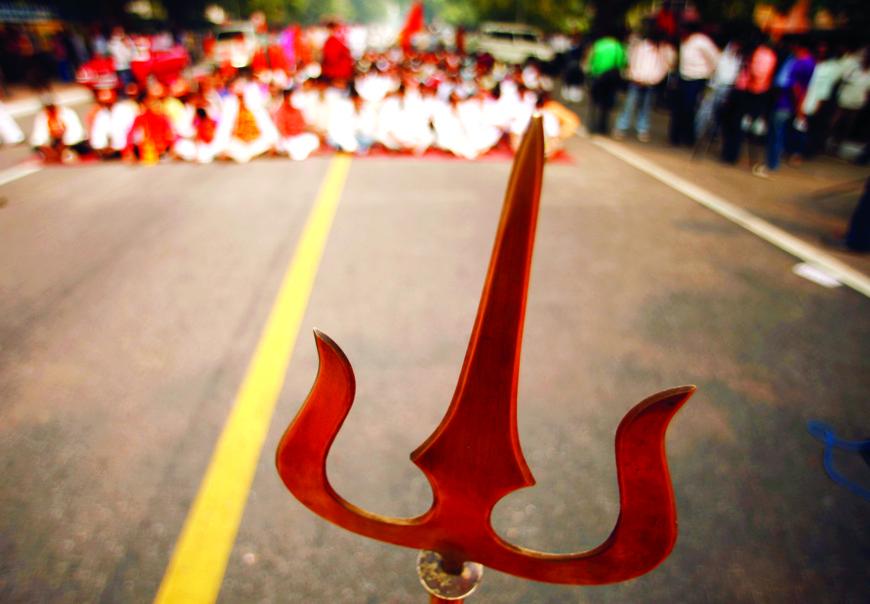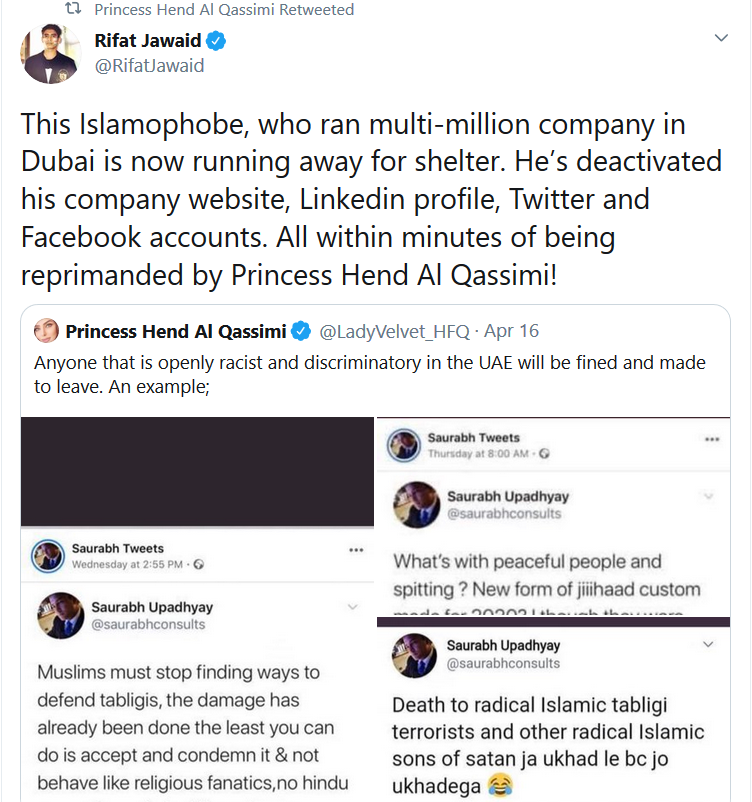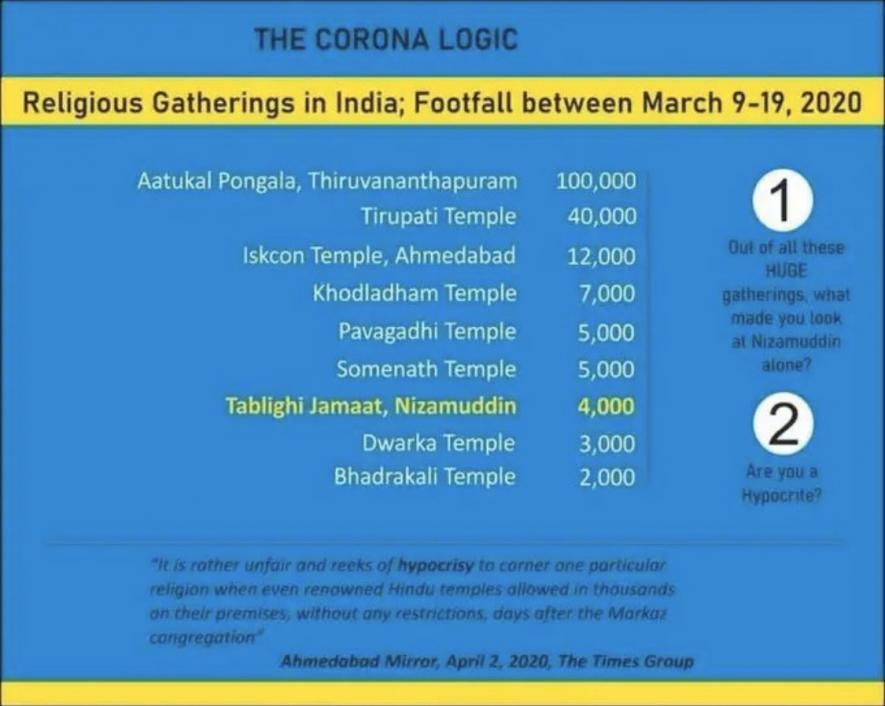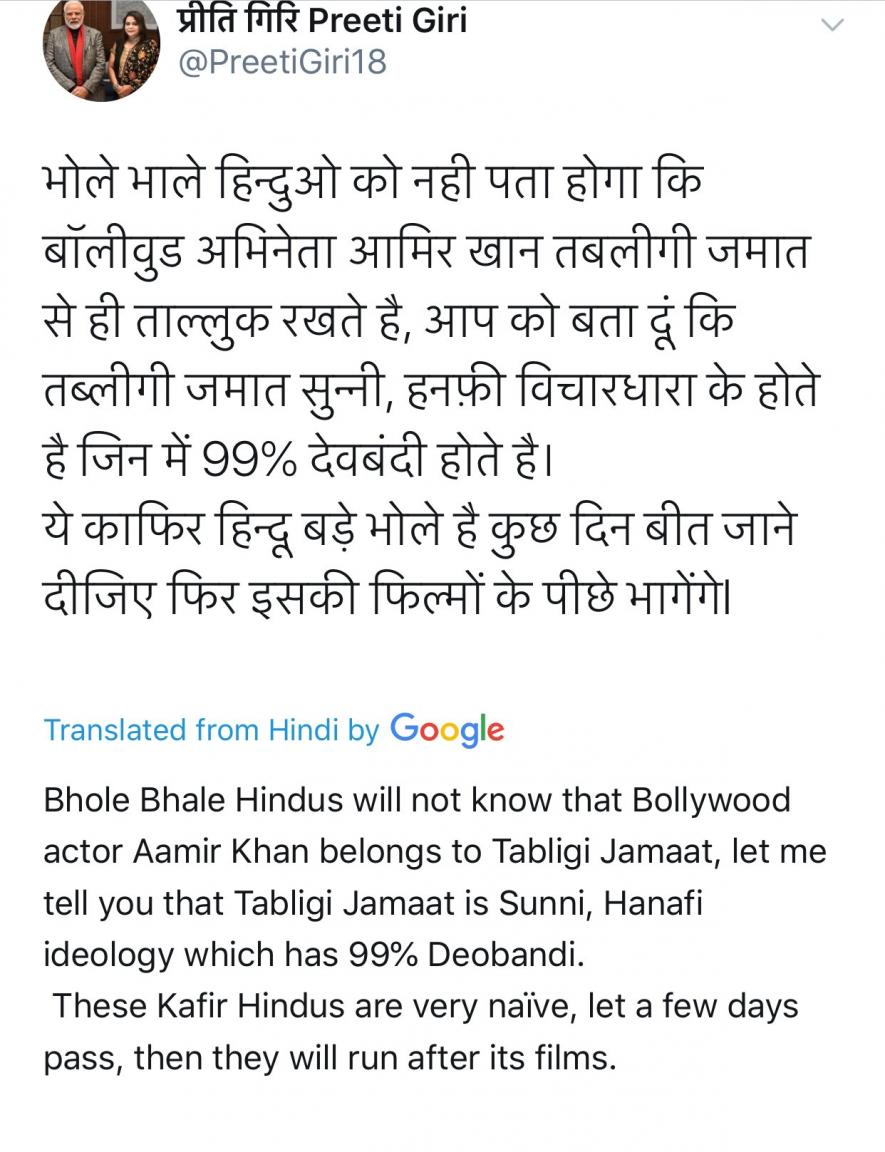Hindutva Has a Cost, Middle-East Elite Remind India

Representational image. | Image Courtesy: countercurrents
One possible reason why Prime Minister Narendra Modi has belatedly cautioned the nation against communalising the Novel Coronavirus could be the flurry of anti-Hindutva tweets emanating from the Middle-East over the last few days. These tweets have expressed outrage against the increasing tendency in India to blame, demonise and target the Muslims for spreading Covid-19, the illness caused by the Novel Coronavirus.
In a recent post on LinkedIn, a popular social networking platform, Modi wrote, “The virus does not see race, religion, colour, caste, creed, language or border before striking.” His remark has come in the wake of several incidents involving violence against Muslims or their social and economic boycott.
Ever since Tablighi Jamaat activists were evacuated from their headquarters in Nizamuddin West, Delhi, late March, and some of them tested positive for Covid-19, certain media outlets went into overdrive blaming them—and, by implication, Muslims—for the spread of Covid-19 in India.
The central government was perceived complicit in creating this impression as its daily briefing, even as recently as last week, made it a point to list separately the number of cases linked to the Tablighi Jamaat.
Fake videos and social media posts gave the Coronavirus the nomenclature of “jihadi virus”, thereby widening the rift between Hindus and Muslims. With segments of expatriate Hindus joining the tirade against Muslims and Islam, Middle-East citizens pushed back, with an uncharacteristic vehemence, against the demonisation of India’s largest minority community.
These Middle-East citizens who have condemned the Hindutva brigade constitute not just ordinary folks, but also members of royal and wealthy families, lawyers, human rights activists, and sections of the Indian diaspora, Hindus and Muslims alike. Some of their tweets accuse the Rashtriya Swayamsevak Sangh of terrorising the Muslims in India.
All this ought to have perturbed Modi, who has invested unprecedented energy in improving India’s relations with countries in the Middle-East. They have, in turn, honoured Modi with awards, and extradited fugitives wanted in criminal cases in India. (India’s Ministry of External Affairs data shows that of the 74 extraditions to India between February 2002 and January 2019, 23 were from the UAE alone.)
Tweets from the Middle-East elite have special significance as they exercise tremendous influence over government policies in a region largely lacking in democracy. Their word counts relatively far more in Middle-East countries than English-speaking, liberal-secular luminaries do in India.
The Modi government must have taken notice when Princess Hend Al Qassimi, a member of the royal family of Sharjah, one of the seven emirates comprising the United Arab Emirates, ticked Saurabh Upadhyay, a businessman, on Twitter. “Anyone who is openly racist and discriminatory in the UAE will be fined and made to leave. An example;” she wrote on 16 April, appending screenshots of Upadhyay’s hate-filled tweets about the Tablighi Jamaat and Muslims.

As soon as Upadhyay was reprimanded by the princess, he seemed to have deleted all his social media accounts, evident from the tweet of journalist Rifat Jawaid: “This Islamophobe, who ran multi-million company in Dubai is now running away for shelter. He’s deactivated his company website, LinkedIn profile, Twitter and Facebook accounts. All within minutes of being reprimanded by Princess Hend Al Qassimi!” Jawaid had written. Qassimi made it a point to share Jawaid’s retweet with her close to 98,000 followers.
In what seems to have been a message to expatriate Hindus, many of whom have flourishing businesses in the UAE, Qassimi emphasised the warm relationship between the Sharjah royal family and India. She, however, went on to add, rather imperiously, “…. As a royal your rudeness is not welcome... You make your bread and butter from this land which you scorn and your ridicule will not go unnoticed.”
Implicit in Qassimi’s tweet is the message—people like Upadhyay, who are based in the UAE, will have to countenance a blowback if they are to denounce Islam and its followers. She also seemed quite acquainted with the controversy surrounding the Jamaat. For instance, she posted a tweet listing the various non-Islamic congregations held between 9 March and 20 March, which clearly suggests that the Tablighi Jamaat could not be accused of deliberately spreading Covid-19 around.

Qassimi reminded India’s social media warriors about Gandhi and what he stood for. Sample this tweet of hers: “Gandhi was a fearless campaigner for the rights & dignity of all people, whose constant & unwavering promotion of non-violence as a tool to win over hearts and minds has forever left its mark on the world. He won my heart and I believe in his peaceful approach to handling hatred.”
Noora Al Ghurair, whose family runs the Al Ghurair conglomerate, took on Preeti Giri, an executive director with a top-notch firm in Dubai. “So as per your hateful logic Sunnis by association are terrorists bcos of the propaganda against Muslims in India? Do U know the country you live all rulers are Sunni? U want to boycott us? @DubaiPoliceHQ has Sunni officers? I am Sunni?”

Preeti Giri, too, deleted her social media accounts.
Noora Al Ghurair also responded to Bharatiya Janata Party Member of Parliament Tejasvi Surya’s insulting and sexist old tweet, which has been doing the rounds of social media, much to the horror of many. She advised him not to visit the Arab land. “Pity Ur upbringing @Tejasvi_Surya that respect for women couldn’t be instilled in U despite India having some great female leaders. Please note if someday the govt bestows a foreign ministry to you, avoid travelling to Arab lands. You are not welcome here. This will be remembered.”
In fact, a Kuwait-based lawyer, who uses the twitter handle @MJALSHRIKA which has nearly 45,000 followers, tagged a question to Modi: “Do you allow your parliamentarian to publicly humiliate our women? We expect your urgent punitive action for his disgraceful comment.”
The lawyer’s expectations are likely to be belied. But it will do India and its foreign relations a great deal of good if Surya could be asked to tweet an apology, or at least stop posting venomous statements against Indian Muslims. At any rate, Surya, too, deleted his nasty remark from Twitter after the reprimand.
Uploading journalist Saba Naqvi’s video on the boycotting of Muslim vendors, @MJALSHRIKA tweeted: “No one will accept this tyranny by Hindutva goons. We appeal to the govt of India to protect the poor Muslim vendors that are being brutally targeted.”
Emphasising the importance of remittances from Middle-East countries, Abdul Rahman Al-Nassar, who has around 2,46,000 followers, tweeted: “Indians (mostly Hindus) are treated well in these countries. In return, how are Muslims treated in India?” Dubbing the Rashtriya Swayamsevak Sangh as a terrorist organisation, Al-Nassar had a question for the United Nations: “UN Human Rights... What is your position regarding the terrorist acts of the RSS party towards the Muslims of India? #india #indian”
He also retweeted a post of the Indian American Muslim Council, which had referred to the arrest of Bollywood actor Ajaz Khan and observed: “Even voicing concern to defend Muslims has become a crime in India. Celebrity arrested for questioning govt blame-game on Muslims.”
Khan was arrested in Mumbai for speaking out, on his Facebook page, about the plight of migrant workers who came out on streets amid the lockdown.“If an ant dies, a Muslim is responsible. Have you ever thought who is responsible for this conspiracy?” he reportedly said in his post.
It is perhaps for the first time the Arab elite are closely watching and commenting on the targeting of Muslims in India, which dates back to 1947. But never before had there been a continuous hate campaign against them, nor had it been spearheaded by the members and followers of the party ruling in India. Perhaps their show of concern can be attributed to the internet knitting the world far seamlessly than before.
Their outrage did spill out in the official arena. On 19 April, the Independent Permanent Human Rights Commission, which has been established by the Organisation of Islamic Cooperation as an expert body with advisory status, condemned the “unrelenting vicious #Islamophobic campaign in #India maligning Muslims for spread of #Covid-19 as well as their negative profiling in media subjecting them to discrimination & violence with impunity.” The OIC comprises 53 Muslim-majority plus another four countries.
Yet the disquiet regarding the targeting of Muslims in India persists in the region. A day after Modi’s LinkedIn post, Khaled Al-Suwaifan, who is a member of the Board of Directors of the Kuwait Bar Association, tweeted, “We call on international organisations, especially the United Nations, the Security Council, the Organization of Islamic Cooperation and all human rights organisations, to intervene immediately to stop the violations committed against our Muslim brothers in India #India.” It was retweeted 2,600 times.
The flurry of anti-Hindutva tweets from the Middle-East could not have come at a more inopportune moment. Modi has made multiple visits to several countries there, and rolled out the red carpet for their leaders in India. His efforts prompted former Indian diplomat Talmiz Ahmad, who had served as ambassador in several Middle-East countries, to note, “Never before in India’s diplomatic history has a prime minister given so much attention to this region.”
India and the Middle-East have a symbiotic relationship. As Ahmad pointed out, “The region is central to India’s energy security, with Gulf Cooperation Council (GCC) providing nearly 50 percent of India’s oil imports. The GCC collectively is also India’s largest regional bloc trading partner, as total trade in 2017-18 was $104 billion, and India-ASEAN trade of $81 billion. In terms of global trade, two of India’s top-five trade partners are from the GCC—the UAE and Saudi Arabia.”
In addition, a large number of Indian expatriates work in the Middle-East and remit billions of rupees home. In 2018, remittances to India were around $78.6 billion, of which, according to the Reserve Bank of India’s fourth round of survey of authorised dealers on inward remittances, 26.9% came from the UAE, 11.6% from Saudi Arabia, 6.5% from Qatar, and 5.5% from Qatar.
Indeed, India has a lot to lose by alienating the Middle-East, which is outraged at the targeting of Muslims even as the world is face-to-face with death. Modi’s LinkedIn post has come three weeks too late and is perhaps too inadequate to stitch the tear in India’s social fabric. Might he not consider asking Indians to bang utensils and ring bells to restore India’s social amity?
(Tweets in Arabic have been machine-translated.)
The author is an independent journalist. The views are personal.
Get the latest reports & analysis with people's perspective on Protests, movements & deep analytical videos, discussions of the current affairs in your Telegram app. Subscribe to NewsClick's Telegram channel & get Real-Time updates on stories, as they get published on our website.
























